Today, in the second of our reports from the 2016 Northern Meeting piping competition, editor Robert Wallace reviews the contest for the Highland Society of London’s Gold Medal….
At 8.30am on the big day I parked my backside in the main auditorium at Eden Court Theatre for an eight-hour listen to one of the most important contests in world piping.
On first (not easy) was Dr Peter McCalister playing the Lament for MacSwan of Roaig. It was immediately noticeable that there was a lack of bass from his instrument. A very good finger fought for projection from the chanter. Variation 1 and T singling were roundish; birls not crisp; nicely expressed ground otherwise.
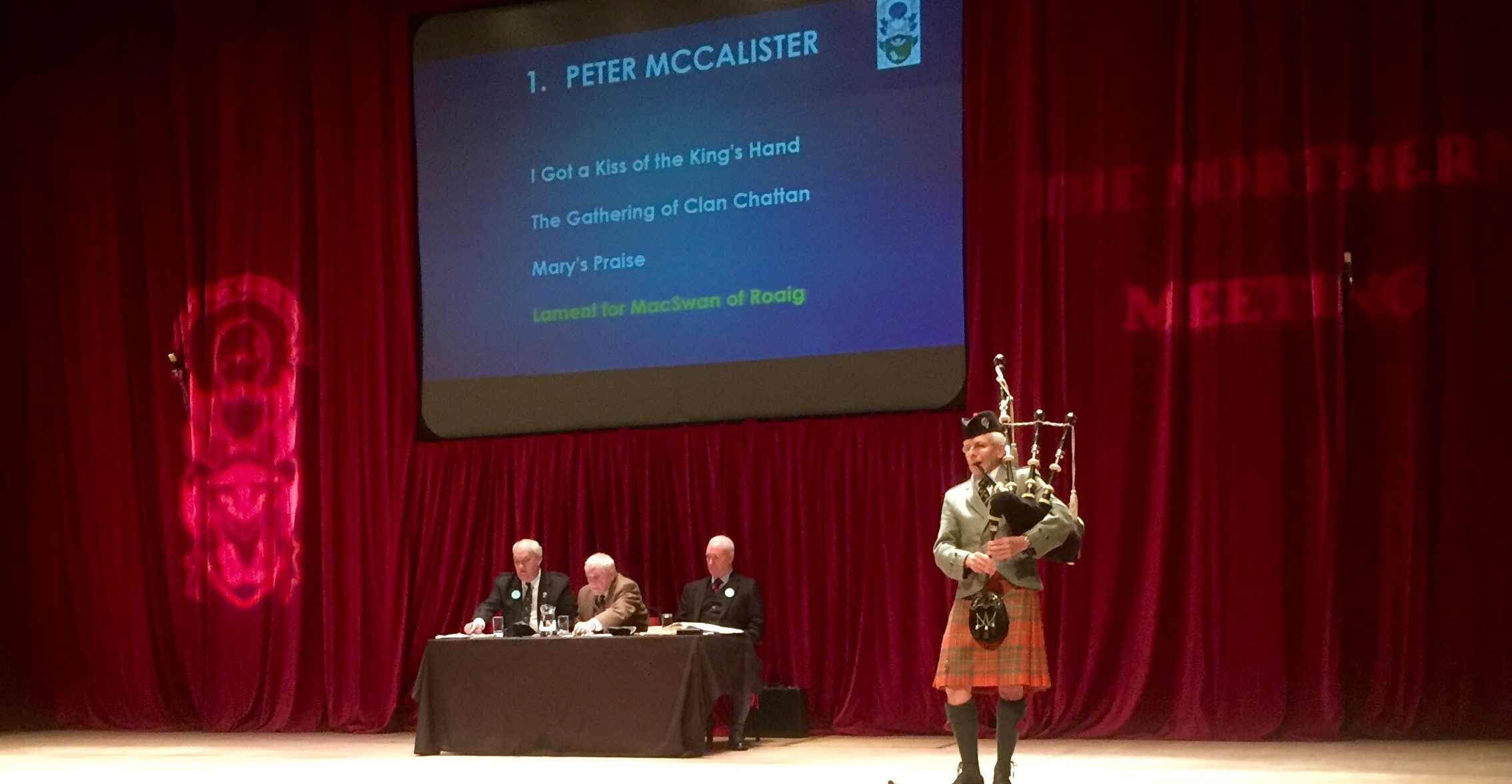
Canada’s Jamie Troy had a pipe which lacked finesse, dull on the bottom hand, B especially. My King Has Landed in Moidart was square, lacking drive and emotion. D T&C movements not consistent – B gracenote made more difficult by the very low position of his back thumb? Numerous errors in the a mach; capable of much, much more.
Mary’s Praise was kept on the move by Innes Smith on a full, resonant pipe – if a shade flat on F. The pendulum variation was not to my taste and the endings of the V1 doubling cut too much. A good tune which diminished slightly as Innes progressed. His day will come.
James MacHattie had the best pipe so far and handled Clan Chattan generally pretty well (more on the low G in the final phrase would enhance things in my view). The drones drifted slightly but overall this was a good performance and I added to my notes: ‘Prize?’
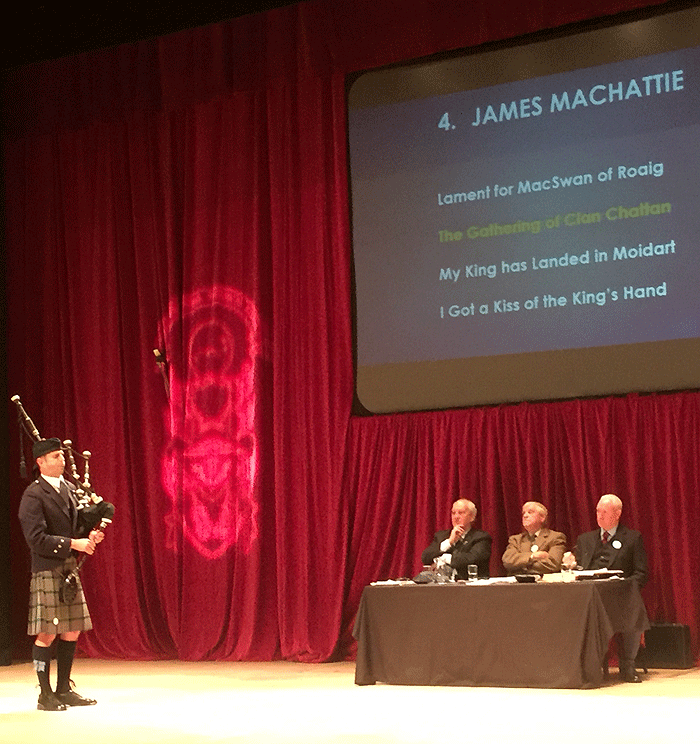
I think Jori Chisholm from Seattle was pulled in at the last minute as a reserve and as one might expect did not seem at all settled in Mary’s Praise; very good technique but fighting drones at end. Good on him for fronting up at short notice. Another reserve, it seemed from his playing out of sequence, was Andrew Lee from BC. The pipe was light but sweet but he had a tendency to play to his feet and the tune lacked flow as a result. Not quite My King is Taking a Nap in Moidart but you get the idea. Again well done to Andrew for filling in the gap in proceedings, if in fact he was called on to do so.
Next came Jim Murray, Fife and Australia, with Isabel MacKay. This was good playing on a fine instrument. Heading straight for the list was our Jim until an aberration in the second line of the crunluath doubling. The Gold Medal does that to pipers. Preparation has to be ultra good or you are always risking a crash and burn. There was an audible sigh of disappointment as Jim left the stage.
Faye Henderson played I Gave a Kiss to the King’s Hand on a lightish but well-fingered pipe. The tune was generally pleasantly handled but distracting in the way she cut the low G connecting notes throughout; slight wavering on C on the chanter. One thing that is absolutely necessary in any Gold Medal contest is a good pipe. John Angus Smith‘s was not ‘on’ from the start and therefore his MacSwan of Roaig was never in contention no matter how well timed and fingered.
The best tune of the morning was delivered by Fiona Manson, Mary’s Praise shaped beautifully on a pleasing instrument. An errant crunluath a mach may have been costly, but Fiona could travel back to Melbourne safe in the knowledge that she could not have done much more to impress. My King again, this time from Alistair Lee. The pipe was never settled and seemed strong. Alistair’s bag started to slip half way through and by the end this quality player was holding on for dear life.
Apart from an off-key D, Gordon Bruce‘s pipe was well set. The technique was good apart from a light birl. However his Isabel MacKay verged on the mechanical with more tempo variation required to bring it to life. The second connecting note in the crunluath was extended and served to detract from the theme. Angus John MacColl was off his tune in several places but demonstrated real promise with good musical appreciation and a finger to match.
After Canada’s Sean MacKeown completed his Isabel MacKay I wrote in my book: ‘The Medal’. In the end it was not to be, but Sean gave us a piobaireachd – Isabel MacKay – to savour. The only downside for me was his high pitch and lightness of drone and it may have been this that was the deciding factor in the judges’ decision. Characterised by superb technique, melodic flow and a masterful understanding of the tune’s structure, this performance will be long remembered by those who heard it.
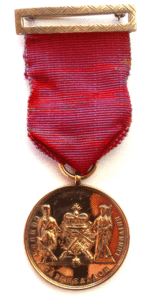 The first Battle of Waternish of the day was played by Derek Midgley from New Jersey. He cut the middle beats in the ground a little and later on had minor chips from his chanter but the tune kept moving, enhanced by an excellent finger. Decker Forrest‘s pipe was robust and shaded off towards the end of Clan Chattan. He was over severe in his cuts down to the bottom hand. The technique, as ever, was top drawer with only one miss in the a mach.
The first Battle of Waternish of the day was played by Derek Midgley from New Jersey. He cut the middle beats in the ground a little and later on had minor chips from his chanter but the tune kept moving, enhanced by an excellent finger. Decker Forrest‘s pipe was robust and shaded off towards the end of Clan Chattan. He was over severe in his cuts down to the bottom hand. The technique, as ever, was top drawer with only one miss in the a mach.
The ground of Lament for MacSwan of Roaig was nicely shaped by Jonathan Greenlees but hiharin troubled him throughout. Thereafter the playing was conservative though well thought out. The pipe was never totally convincing, one’s impression varying depending on where he was on the stage at a given time. Eden Court acoustics can sometimes be misleading.
Not so with Ian K MacDonald, Toronto. After a full five minutes of tuning, here was a bagpipe that would win any contest – and a piper ready to do it full justice. Playing the same tune with which he won the Oban medal, Mary’s Praise, Ian demonstrated all his experience and control with perfectly balanced phrasing and changes in tempi – a master at work on a magnificent instrument; it did not budge from start to finish. Technique exemplary. My notebook records this in underlined capitals: ‘The Double!’
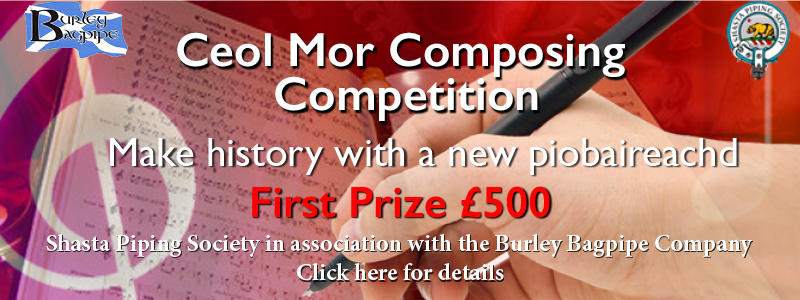 Sandy Cameron, last year’s Silver Medallist, did well in his first go at the big one; just off the pace in the pipe (flattish + choke) and finger departments (crunluath and a mach). That apart, his King’s Hand was well handled. The Battle of Waternish was played by Cameron Drummond on a superb pipe. Unfortunately his timing in the ground, especially the final phrase, left one cold. He seemed to be adding an extra beat with the way he stretched the low As and low Gs. That aside the tune was nicely interpreted and well fingered.
Sandy Cameron, last year’s Silver Medallist, did well in his first go at the big one; just off the pace in the pipe (flattish + choke) and finger departments (crunluath and a mach). That apart, his King’s Hand was well handled. The Battle of Waternish was played by Cameron Drummond on a superb pipe. Unfortunately his timing in the ground, especially the final phrase, left one cold. He seemed to be adding an extra beat with the way he stretched the low As and low Gs. That aside the tune was nicely interpreted and well fingered.
The D on Andrea Boyd‘s chanter was very flat throughout and her MacSwan suffered accordingly. Embari needed to be more crisply executed but the rest of her technique was of high order. The blowing wavered as she struggled to get some tone out of the bottom hand. William Geddes had a lovely pipe, but nerves seemed to get the better of him with erratic timing in the Var.1 doubling and an error in the crunluath doubling.
Another MacSwan, this time from Jamie Forrester. There were some squeaks from high G and Jamie was stiff with the melodic line of this celebrated piece, especially noticeable in the singling of Variation 1. Alasdair Henderson snatched at the B between the Es and the D throws in the ground of My King. Despite a fine instrument, he had a choke and some inconsistencies in his crunluath. Last on, Andrew Carlisle played Clan Chattan in convincing style with control and expression throughout. He could have, perhaps, pushed the T&C doublings along more but this was a big improvement on his playing of this tune in Carolina earlier in the year. Andrew seems to have taken the pipe band out of his solo instrument and is all the better for it.
In the final analysis a good competition with some outstanding playing, especially from the prizewinners. The result:
1 Ian K MacDonald
2 Sean MacKeown
3 Cameron Drummond
4 Andrew Carlisle
5 Faye Henderson.
Judges: Iain MacFadyen, Ronald MacShannon, John Wilson.
A couple of thoughts before I finish. Inverness has a rule, a good one in my view, that men must play with jackets. Does this confer an advantage on lady pipers who choose female attire (tartan skirt, blouse etc) over male? Second point: can we get back to the system whereby tunes played at Oban are not repeated at Inverness? Some might perceive an advantage to those given the same tune. Also, we hardly heard Stewart’s White Banner – a quality tune and I can only assume very few pipers had it in.
Ian K MacDonald is pictured up top on his way to double glory and his place in the piping history books.







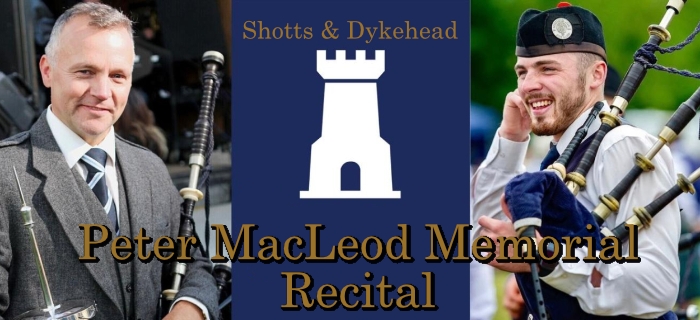








Recent Comments